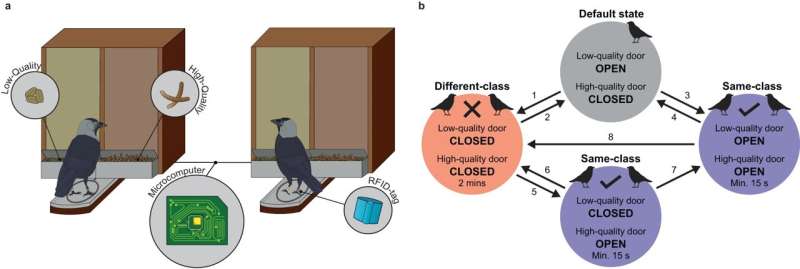This article has been reviewed according to Science X's editorial process and policies. Editors have highlighted the following attributes while ensuring the content's credibility:
fact-checked
peer-reviewed publication
trusted source
proofread
Study shows jackdaws switch friends to gain food, but stick with family

Jackdaws ditch old friends and make new ones if it helps them get rewards—but stick with family through thick and thin, new research shows.
Scientists from the universities of Exeter and Bristol presented wild jackdaws with a task where access to tasty mealworms depended on which individuals visited together.
The birds soon switched friends to get the best rewards, but they stuck with their offspring, siblings and mating partners (jackdaws pair for life) no matter what the outcome.
The study, led by Dr. Michael Kings and Dr. Josh Arbon, under the supervision of Professor Alex Thornton as part of the Cornish Jackdaw Project, provides new insights on how animals manage social relationships. The study is published in Nature Communications.
Professor Thornton, from the Center for Ecology and Conservation at Exeter's Penryn Campus in Cornwall, said, "At the Cornish Jackdaw Project, we monitor hundreds of wild jackdaws, each of which is fitted with a tiny PIT tag—like the transponder chips used for pet cats and dogs—embedded in a leg ring.
"In this experiment we randomly assigned jackdaws to two groups—A or B—and programmed a pair of automated PIT tag-detecting feeders to provide delicious mealworms only if individuals from the same group (AA or BB) visited together.
"The jackdaws turned out to be very strategic, quickly learning to hang out with members of their own group and ditching old 'friends' from the other group so they could get the best rewards.
"However, they made an exception when it came to their close relations."
Dr. Kings, from the University of Exeter, said, "These results have important implications for our understanding of the evolution of intelligence as they show that being able to track and remember information about social partners can bring benefits."
Dr. Arbon, now at the University of Bristol, added, "Our findings also help us to understand how societies emerge from individual decisions. The balance between strategically playing the field for short-term benefits and investing in valuable long-term partners ultimately shapes the structure of animal societies, including our own."
The research team included the University of Konstanz.
More information: Michael Kings et al, Wild jackdaws can selectively adjust their social associations while preserving valuable long-term relationships, Nature Communications (2023). DOI: 10.1038/s41467-023-40808-7
Journal information: Nature Communications
Provided by University of Exeter


















